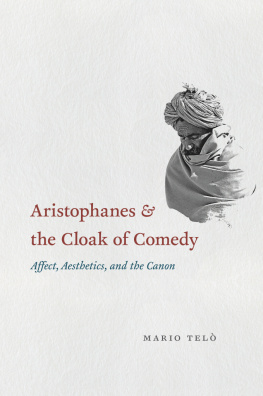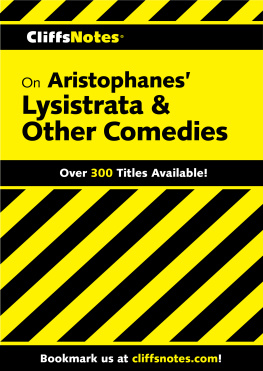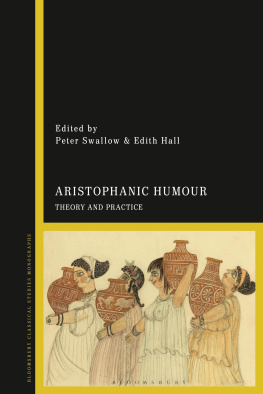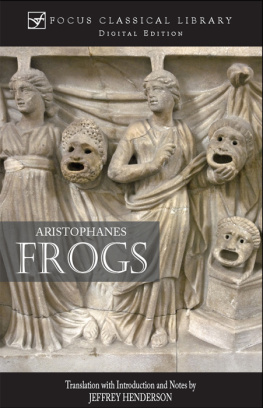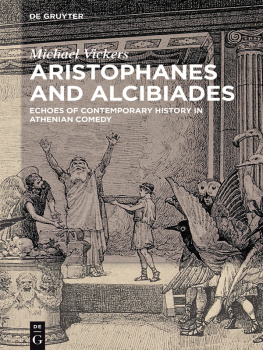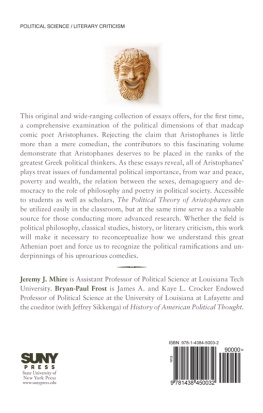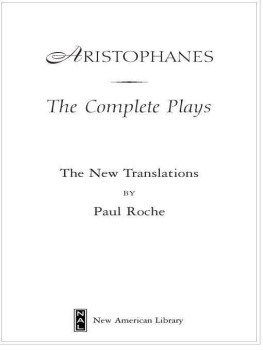Mario Tel - Aristophanes and the Cloak of Comedy
Here you can read online Mario Tel - Aristophanes and the Cloak of Comedy full text of the book (entire story) in english for free. Download pdf and epub, get meaning, cover and reviews about this ebook. year: 2016, publisher: University of Chicago Press, genre: Romance novel. Description of the work, (preface) as well as reviews are available. Best literature library LitArk.com created for fans of good reading and offers a wide selection of genres:
Romance novel
Science fiction
Adventure
Detective
Science
History
Home and family
Prose
Art
Politics
Computer
Non-fiction
Religion
Business
Children
Humor
Choose a favorite category and find really read worthwhile books. Enjoy immersion in the world of imagination, feel the emotions of the characters or learn something new for yourself, make an fascinating discovery.
- Book:Aristophanes and the Cloak of Comedy
- Author:
- Publisher:University of Chicago Press
- Genre:
- Year:2016
- Rating:3 / 5
- Favourites:Add to favourites
- Your mark:
- 60
- 1
- 2
- 3
- 4
- 5
Aristophanes and the Cloak of Comedy: summary, description and annotation
We offer to read an annotation, description, summary or preface (depends on what the author of the book "Aristophanes and the Cloak of Comedy" wrote himself). If you haven't found the necessary information about the book — write in the comments, we will try to find it.
Aristophanes and the Cloak of Comedy — read online for free the complete book (whole text) full work
Below is the text of the book, divided by pages. System saving the place of the last page read, allows you to conveniently read the book "Aristophanes and the Cloak of Comedy" online for free, without having to search again every time where you left off. Put a bookmark, and you can go to the page where you finished reading at any time.
Font size:
Interval:
Bookmark:
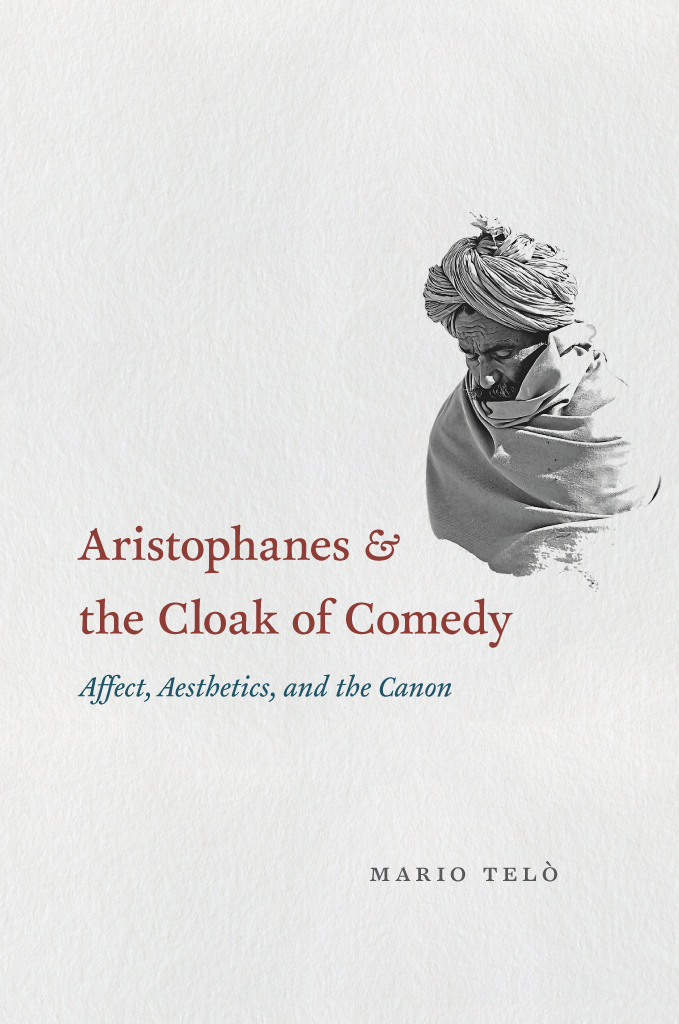
Mario Tel
The University of Chicago Press
CHICAGO & LONDON
Mario Tel is associate professor of classics at the University of California, Los Angeles.
The University of Chicago Press, Chicago 60637
The University of Chicago Press, Ltd., London
2016 by The University of Chicago
All rights reserved. Published 2016.
Printed in the United States of America
25 24 23 22 21 20 19 18 17 16 1 2 3 4 5
ISBN -13: 978-0-226-30969-9 (cloth)
ISBN -13: 978-0-226-30972-9 (e-book)
DOI : 10.7208/chicago/9780226309729.001.0001
Library of Congress Cataloging-in-Publication Data
Names: Tel, Mario, 1977author.
Title: Aristophanes and the cloak of comedy : affect, aesthetics, and the canon / Mario Tel.
Description: Chicago ; London : The University of Chicago Press, 2016. | Includes bibliographical references and index.
Identifiers: LCCN 2015036902 | ISBN 9780226309699 (cloth : alk. paper) | ISBN 9780226309729 (e-book)
Subjects: LCSH: AristophanesCriticism and interpretation. | Greek drama (Comedy)History and criticism.
Classification: LCC PA3879 .T43 2016 | DDC 882/.014c23 LC record available at http://lccn.loc.gov/2015036902
This paper meets the requirements of ANSI/NISO Z39.48-1992 (Permanence of Paper).
To Alex
This book has been through a long journey, not unlike my own. It started in Italy with a nebulous, pseudo-Bloomian interest in parental bonds and literary affiliation throughout Greek drama. By the time of my trans-Atlantic passage, to Southern California, I envisioned a series of case studies on the metapoetics of fatherhood drawn from Aristophanes. When I began writing the book, I was serendipitously intrigued by the prominence of two similar pieces of clothing in Wasps and the second version of Clouds, both of them plays that concern father-son relationships and spring from a competitive setback. With the forensic attitude of a philologist, I took it upon myself to piece together things that seemed unconnected: not just father-son relationships but textiles and an ultimately canonical poets artistic failure. My original interest in poetic self-reflexivity had come to include aesthetics, materiality, and canonicity. I soon realized that the resolution of the puzzle I was investigating could occupy a whole book. Instead of collecting multiple case studies, I would apply my close readings to the reconstruction of a narrative that, though centered in two plays, stretches into their afterlife, with ramifications for Aristophanes authorial survival.
My journey would not have happened in the first place without the generous support and encouragement of Joseph Farrell, Donald Mastronarde, Glenn Most, and Seth Schein, with special thanks to Ralph Rosen, who warmly and selflessly shepherded me toward employment in American academia. Thanks are also due to my wonderful UCLA colleagues, who welcomed me and have provided a fertile intellectual environment for these past seven years, including Catherine Atherton, Ann Bergren, David Blank, Shane Butler, Sander Goldberg, Robert Gurval, Chris Johanson, Francesca Martelli, Kathryn Morgan, Sarah Morris, John Papadopoulos, Alex Purves, Amy Richlin, Giulia Sissa, and Brent Vine. They all, in various ways, have supported me and helped me bring this project to fruition.
The core argument in this book had its first public airing in a talk at Berkeley in April 2012. I thank my UC colleagues Mark Griffith, Leslie Kurke, and Donald Mastronarde for their warm reception and invaluable feedback, which gave me the strength to continue. Donald, to whom I owe a major debt of gratitude dating back to my first visit to Berkeley, as an undergraduate in 1999, has been a source of support throughout the completion of this book. He read the first chapter, offering insightful comments from which I benefited enormously. So did Karen Bassi, Lucia Prauscello, and Ralph Rosen. In particular, Karen helped me work through the theoretical implications of the argument, while Ralph gently yet firmly urged me to think big and to clarify structure and organization. Seth Schein and Kathryn Morgan both helped with the books abstract. Emily Gowers read the epilogue, improving form and substance with her distinctive wit and kindness. The participants in the June 2014 Cambridge conference Recontextualizing Occasion: Reperformance in Ancient Greece, organized by Anna Uhlig and Richard Hunter, lent an attentive and sympathetic ear to some of the contents of the book. I also want to thank Jim Porter for conversations through the years that, together with his writings, have deeply influenced my thinking.
Deepest thanks go to Alex Purves for her advice and support, and the inspiration she provides. Alex read the manuscript twice, showing enthusiasm for the projecteven when I had none leftand changed my perspective on a number of key issues. She made me realize that ultimately my project was about the affect of genre and prodded me to read in affect theory and the new materialism. I am grateful for her inexhaustibly stimulating presence, which has profoundly enriched me as a scholar.
At the University of Chicago Press I found in Susan Bielstein the ideal editor: visionary, perceptive, and generousan authors dream. James Whitman Toftness was an unrivaled example of efficiency, kindness, and responsiveness. Thanks are also due to Susan Karani, my copy editor, for her patience and attention.
I am grateful for the insights of my two no-longer-anonymous readers. Charles Platter, whose work on Aristophanes has greatly informed my own, provided much-needed encouragement and innumerable astute observations. Melissa Mueller offered essential guidance and contributed to making the manuscript clearer, tighter, and stronger. Her groundbreaking work on objects in tragedy infuses me with energy and excitement. I am also grateful to Leslie Kurke for reading the manuscript at a late stage and promptly supplying fantastic comments, additions, and corrections with characteristic generosity and acuity. Her extraordinary example of adventurous and rigorous scholarship continually inspires me.
This book would have never seen the light of day without the unceasing, painstaking help of Alex Press, my life partner. Alex taught me how to write in English, reinforcing for me the value of clear prose, free from flowery embellishments and jargon. He never tired of correcting sentences, streamlining paragraphs, and reconceptualizing whole pages. He read the manuscript multiple times, improving it at every round in wonderful ways. He was also a constant intellectual interlocutor, talking me through ideas and helping me overcome doubts and hesitations with patience and commitment. This book owes to him much more than can be measured in words. The dedication to him is a minimal compensation for the Heraclean efforts he has put into this project.
Santa Monica, 2015
Several of the features of this book are designed to make it more accessible to non-classicists. All Greek is translated or closely paraphrased, and the Greek words and phrases I discuss are all transliterated. (In general, inflectional endings are preserved in quotations.) Readers who forget what a particular Greek term means can refer to the index for the first occurrence. Because of my programmatically nonlinear reading of Wasps and Clouds, I have provided, before the endnotes, synopses that map out, in a linear manner, the scenes that I discuss.
Font size:
Interval:
Bookmark:
Similar books «Aristophanes and the Cloak of Comedy»
Look at similar books to Aristophanes and the Cloak of Comedy. We have selected literature similar in name and meaning in the hope of providing readers with more options to find new, interesting, not yet read works.
Discussion, reviews of the book Aristophanes and the Cloak of Comedy and just readers' own opinions. Leave your comments, write what you think about the work, its meaning or the main characters. Specify what exactly you liked and what you didn't like, and why you think so.

